Wetlands play an important role for the suggested Sustainable Development Goals (SDGS) on food security and poverty eradication, ecosystems and biodiversity, water and climate change adaptation. If disconnected, actions taken to achieve one goal can easily conflict with others. Wetlands as agricultural frontier, livelihood source and service provider – are we setting wetlands policies on a collision course?
Join the Wetlandsforum conversation at the 2015 Stockholm World Water Week,
23rd August 2015, 16:00-17:30, Pillar Hall
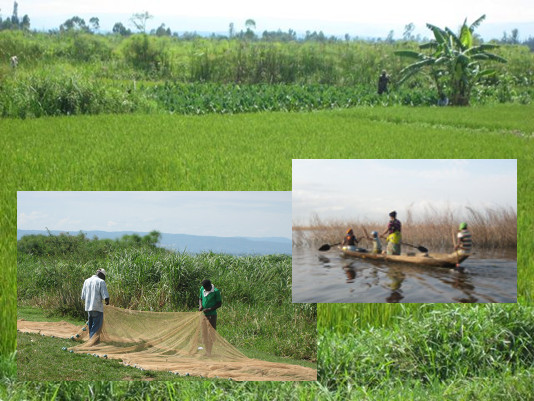
- Download Event Flyer
- Check background materials
- Share your priorities
- SWWW website and registration
Why this discussion?
Wetlands provide essential natural infrastructure for water regulation and disaster prevention, and support diverse livelihoods. Nevertheless, wetlands are exposed to immense pressures from pollution, urbanization, and expanding agriculture.
Ongoing decline of wetlands is aggravated by conflicts between policies for agricultural food production, economic development and wetlands conservation, often resulting in votes for short-term economic gains and vested interests at the expense of long-term sustainability.
Wetlands play an important role for the suggested Sustainable Development Goals (SDGS) on food security and poverty eradication, ecosystems and biodiversity, water and climate change adaptation. If disconnected, actions taken to achieve one goal can easily conflict with others.
As one prominent example, increasing attention to food security drives wetland conversions across Africa. But intensification of wetlands agriculture undermines local livelihoods and diminishes life-sustaining ecosystem services.
Meet us in Stockholm
To foster a more integrated approach to wetlands-related policy, strategy and investment, the International Union for Conservation of Nature (IUCN), the International Water Management Institute (IWMI), the Nile Basin Capacity Building Network (NBCBN), the Secretariat of the Ramsar Convention on Wetlands and the UNESCO-IHE Institute for Water Education are delighted to announce the Wetlandsforum event “Wetlands for Food Security: Solution or Illusion?” to be held during the 2015 World Water Week.
Building bridges
Intensified use of wetlands in the future requires evidence-based policies and valuation of the full extent of ecosystem services they provide, as well as broad and integrated understanding of their ecological and social functions.
The event aims to build bridges between often disconnected communities promoting livelihoods in wetlands, ecosystem protection and economic development, respectively.
The event targets policy makers, government agencies, NGOs, private sector actors, development agencies and researchers involved with
- sustainable intensification of agriculture and food security;
- agricultural and associated investment;
- rural development and rural livelihoods;
- environmental protection and biodiversity;
- water resource management and green infrastructure; and
- wetland and landscape management.

Objectives
The event will showcase, contrast and integrate different perspectives on the role of wetlands for food production, water management, disaster prevention, climate resilience and biodiversity.
It will take stock of solutions suggested for African wetland management at local, national and regional scales and explore the contribution of networks and communities of practice to improve policies for sustainable wetland use.
In particular, the session aims to clarify the role of wetlands for achieving the post-2015 agenda and the relevance of the suggested SDG for wetlands management at the regional and local level.
- What did we learn from the MDG process?
- What do we need to do better in the SDGs?
Download the Flyer



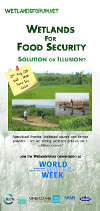
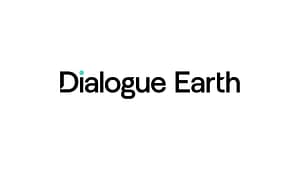 Women in Mandla, Madhya Pradesh are becoming leaders of their homestead farms.
Women in Mandla, Madhya Pradesh are becoming leaders of their homestead farms.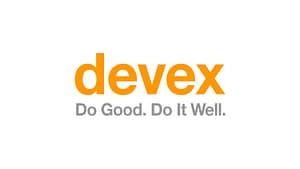 Mark Smith, IWMI's director general shares insights on how governments can plan and implement policies to manage future water risks in food systems.
Mark Smith, IWMI's director general shares insights on how governments can plan and implement policies to manage future water risks in food systems.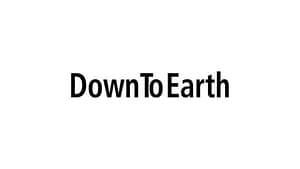 Alok Sikka and Giriraj Amarnath reflect on how, through partnerships with institutions like IWMI, Bharat-VISTAAR can evolve from a data platform into a decision-ready public good.
Alok Sikka and Giriraj Amarnath reflect on how, through partnerships with institutions like IWMI, Bharat-VISTAAR can evolve from a data platform into a decision-ready public good. IWMI's Muhammad Ashraf shares expert insight on sustainable groundwater management to address Balochistan's water crisis.
IWMI's Muhammad Ashraf shares expert insight on sustainable groundwater management to address Balochistan's water crisis.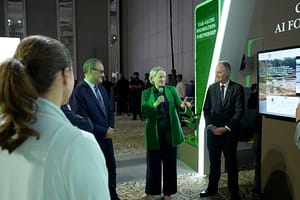 Through CGIAR’s AI Hub, IWMI researchers lend expertise to a global push to apply AI in agriculture and water resilience.
Through CGIAR’s AI Hub, IWMI researchers lend expertise to a global push to apply AI in agriculture and water resilience.